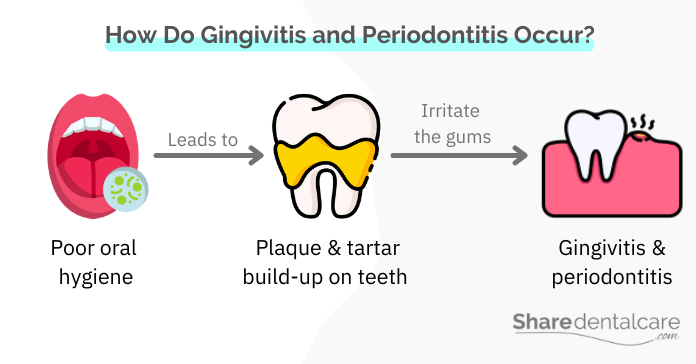Gingivitis is a mild form of gum disease, a bacterial infection of the gums. If left untreated, it can lead to periodontitis, which destroys the tooth-supporting tissues and can lead to tooth loss. According to the Centers for Disease Control and Prevention, approximately 47% of adults aged 30 years old and older are suffering from some form of gum disease. In this blog post, We will discuss the causes of gingivitis and the bacteria responsible for gum disease.
How Does Gingivitis Occur?
Dental plaque is a sticky film of bacteria that builds up on your teeth every day. Plaque bacteria feed on food particles and produce acid during the process. This acid irritates the gums, causing them to become red and swollen. Besides, these bacteria produce sulfur compounds that cause bad breath. Consuming sugary food promotes the growth of bacteria and causes gingivitis.
You can read more about the beginning stages of gingivitis.
If gingivitis is left untreated, bacteria will spread to the tooth-supporting tissues and causes periodontitis, a severe form of gum disease. It affects the gums and bones that support your teeth. Once periodontitis occurs, it can lead to tooth loss.

Causes & Risk Factors
The following factors allow plaque buildup, the growth of bacteria, and increase the risk of gingivitis and periodontitis.
- Poor oral hygiene allows plaque buildup on teeth and gums.
- Smoking or chewing tobacco products increases the risk of gum disease. Also, you can get dark gums from smoking.
- Dry mouth condition.
- Eating a lot of sugary foods
- Dehydration.
- Poor diet and vitamin deficiencies.
- Medication that causes dry mouth as a side effect.
- Medical conditions and diseases that weaken your immune system include diabetes, cancer, and HIV.
- People with a family history of periodontitis are at a higher risk of getting the disease.
What Bacteria Causes Gingivitis?
Anaerobic bacteria are responsible for gingivitis. These bacteria live and grow in places with no oxygen. Among these anaerobic bacteria,
- Aggregatibacter actinomycetemcomitans
- Porphyromonas gingivalis
- Prevotella intermedia
- Bacteroides forsythias
- Campylobacter rectus
- Eubacterium datum
- Peptostreptococcus micros
- Streptococcus intermedius
- Treponema denticola
Bacteria That Causes Gingivitis Can Impact Your Overall Health
Gingivitis bacteria can travel through your bloodstream and reach other parts of your body, such as your heart, lungs, and brain. Research shows that these bacteria can increase your risk of:
- Heart disease
- Stroke
- Lung disease
- Alzheimer’s disease and other forms of dementia.
Researchers also found that gum disease makes it difficult for people with diabetes to control their blood sugar levels, which can cause diabetic complications. In pregnant women, gingivitis bacteria can also increase the risk of delivering babies prematurely and the low birth weight of the baby.
What Bacteria Causes Gingivitis – Conclusion
Gingivitis is a bacterial infection that can have serious health consequences if left untreated. The bacteria responsible for gingivitis are anaerobic and live in areas without oxygen, such as dental plaque. These bacteria produce acid, which irritates the gums, causing them to become red and swollen. If this condition isn’t treated, it can lead to periodontitis, a severe gum disease affecting the tooth-supporting tissues. Research shows that these bacteria can travel to other parts of the body through your bloodstream and increase your risk for heart disease, stroke, lung disease, and many other conditions. You can read more about how is gingivitis treated.